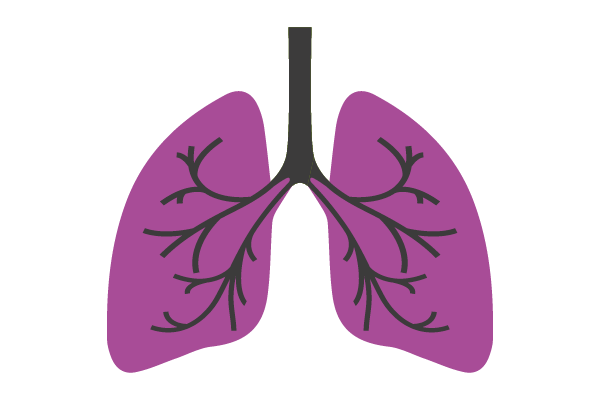Respiratory
The HI NENC Respiratory Programme aims to improve health outcomes for those living with Respiratory conditions.
Background
- The NHS Long Term Plan identifies respiratory disease as a clinical priority; it affects one in five people and is the third biggest cause of death in the England (after cancer and cardiovascular disease)
- Hospital admissions for lung disease have risen over the past seven years at three times the rate of all admissions generally
- Respiratory diseases are a major factor in winter pressures faced by the NHS; most respiratory admissions are non-elective and during the winter period these double in number
- The annual economic burden of asthma and COPD on the NHS in the UK is estimated as £3 billion and £1.9 billion respectively. In total, lung conditions directly cost the NHS in the UK £11billion annually.
HI NENC has invested in Respiratory projects since 2013, a significant body of work has been developed, a selection of which can be found below in the Previous Projects section below.
Current Projects
Our respiratory programme has been set up to support various initiatives related to the management of asthma and COPD including:
Improving Outcomes for Respiratory Patients
Overuse of asthma inhalers has been reported to be a major contributor to CO2 emissions in respiratory care. This project aims to reduce the environmental impact of inhalers and is helping clinicians to choose an inhaler which is better for the patient and better for the planet. Find out more.
Artificial Intelligence Spirometry
The NHS Long Term Plan (LTP), which outlines the nation’s planned health investments, identified lung disease as a national clinical priority. The LTP aims for earlier and more accurate diagnosis of lung conditions. An important diagnostic tool for lung conditions is spirometry (a forceful blowing test). Previous research has shown that spirometry performed in general practice is of poor quality, in particular the interpretation of tests. This project uses AI software to assess and interpret readings. Find out more.
Fractional exhaled Nitric Oxide (FeNO) testing
(FeNO) testing is a simple, non-invasive test to measure the amount of nitric oxide in an exhaled breath – a biomarker for airway inflammation. HI NENC provided spread and adoption support regionally from April 2021 to March 2023. Find out more.
For more information about the HI NENC Respiratory Programme contact [email protected]
HI NENC in collaboration with the British Lung Foundation and Newcastle Healthy Lungs has created the video “Changing Lives – Breathing Better” to promote the value of Pulmonary Rehabilitation (PR).
Case Study – Can respiratory specialist nurse support improve COPD management in primary care_
Please find below a selection of reports and case studies:
Asthma Clinical Handover Project
Optimising the management of COPD exacerbations in primary care
Management of COPD in Primary Care in Newcastle
An Evaluation of the delivery of Shared Medical Appointments
Previous Projects:
Beat Asthma+
Asthma and COPD Discharge Bundle – Developing a Regional COPD Bundle aims
Development & Implementation of a Regional COPD Bundle. Read more on the background and project information here
The videos aim to provide an insight directly from a patient’s perspective into the benefits of PR and can be used as an educational tool for both patients and clinicians.
Throughout the NENC area provision of ‘stop smoking services’ is varied. There is some fantastic work and projects being developed and implemented that will make a real difference in supporting patients to stop smoking and this will significantly improve the overall health of these individuals and reduce resource use within the NHS.
There are also considerable challenges faced by local authorities with ever decreasing Public Health budgets. ‘Stop Smoking Services’ are unfortunately not mandatory and nationally some authorities are even considering not providing a service at all.
Individual service providers will face similar financial pressures and implementation challenges and will meet these challenges in different ways.
HI NENC, in collaboration with Fresh NE are looking at ways support service providers across the area, sharing best practice to help overcome the challenges.
Collaboration to reduce smoking in targeted groups
We have funded several projects in spirometry, a selection is show below:
As a key partner of NHS England’s Accelerated Access Collaborative (AAC), the AHSN Network has supported the rollout of Fractional exhaled Nitric Oxide (FeNO) testing to improve the asthma pathway in England as part of the AAC Rapid Uptake Products (RUP) programme.
The AHSN NENC provided spread and adoption support regionally from April 2021 to March 2023.
Background
Fractional exhaled Nitric Oxide (FeNO) testing is a simple, non-invasive test to measure the amount of nitric oxide in an exhaled breath – a biomarker for airway inflammation.
FeNO testing can improve patient care by contributing to a faster and more effective asthma diagnosis when used alongside a detailed clinical history and other tests. It can also be used to monitor patient response to asthma treatments.
In 2020, it was noted that FeNO testing had lower-than-expected patient access, presenting an opportunity to improve uptake and support the NHS Long Term Plan ambition of improving early and accurate diagnosis of respiratory conditions by embedding FeNO testing in primary care.
What we did
The programme focused on collaboration at a national, regional and local level across healthcare systems, industry partners, patients, and the community and voluntary sector to integrate FeNO testing into everyday clinical practice.
We worked within our local systems across the North East and North Cumbria to support asthma pathway improvements by taking a pathway-based transformation approach. We provided clinical and transformation leadership, shared best practice and developed education and implementation materials for those involved in providing asthma care.
A package of educational resources to support FeNO implementation, including information documents, podcasts, posters, learning modules and webinars, was created to support clinicians. The toolkits were designed in a practical way to support teams adopting and sustaining the use of FeNO.
Outcomes
The programme aimed to improve patient care and outcomes through enhanced access to diagnostics and treatments for severe asthma. The full impact of the programmes is still being finalised however interim data shows that between April 2021 and February 2023:
- An estimated 190,818 additional patients benefited from diagnostic FeNO testing across England.
- 33 Pathway Transformation Fund projects were completed to support wider adoption of FeNO.
For the clinical workforce delivering asthma care the programme has supported learning, training and development.
- 722 people attended webinars and learning collaboratives related to FeNO.
- The FeNO online resource toolkit has been accessed more than 13,500 times.
Regional outcomes
A total of 20 FeNO testing devices were secured and shared across 10 sites in the North East and North Cumbria. The sites were spread over the following three lead organisations:
- North Cumbria CCG
- Durham Dales PCN
- County Durham and Darlington NHS Foundation Trust
During the course of the two-year programme in the region:
- An estimated 1,112 additional patients benefited from diagnostic FeNO testing.
- 10 Pathway Transformation Fund projects were completed to support wider adoption of FeNO.
- 67 people attended webinars and learning collaboratives related to FeNO.
- Over 3,000 tests per month were administered.
Click here to see the Improving Access to FeNO testing in rural communities case study
Next Steps
Due to the significant interest in FeNO testing across the local system, we also purchased 15 additional devices for other sites which were unable to secure them through the RUP programme. A further seven FeNO testing devices were also made available to the region at the end of 2022 which will be disseminated to interested sites in 2023.
The national FeNO programme has now completed and has made substantial contributions to the transformation of asthma care in England while significantly increasing the access to and adoption of FeNO. Learning from the AHSN programmes is being fed into the development of NICE/SIGN/British Thoracic Society asthma guidance, expected in 2024, offering real-world insights to implementation considerations.
Improving Outcomes for Respiratory Patients

Medicines account for 25% of emissions within the NHS, with inhalers contributing a significant proportion. In response to the urgent need to reduce global greenhouse gas emissions, the NHS has committed to reduce its carbon footprint to net-zero by 2040,…
Artificial Intelligence Spirometry

Lung disease is the third biggest cause of death in the UK, and a major reason for winter bed pressures in the NHS. Even before Covid-19, lung conditions cost the UK £9.9 billion each year. The NHS Long Term Plan…

